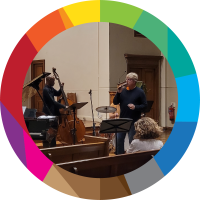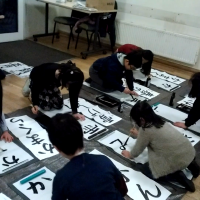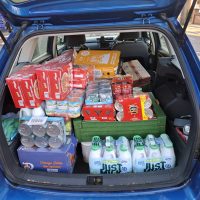Reflection given by Revd Sue McCoan 1st August 2021
John 6:24-35
In the baptism, earlier on, we made promises to Stephanie. The parents and godparents made their specific promises, and then as a congregation we said we would welcome Stephanie, and would share with her what we ourselves have received, the gift of God’s love revealed in Christ.
I hope we take this promise seriously/ Both the welcome and the sharing are a long-term commitment; and we have so much to share, and each of us may have something different to share with Stephanie as and when the time is right.
There is a lot we can offer. But there is also a lot we can learn from her. I’d like to suggest three things we can learn from Stephanie.
First: Stephanie knows when she is hungry.
In fact everybody knows when Stephanie is hungry, because she cries. And she will keep crying, and get louder and louder, until the food comes. She has no words yet, but she can make her needs understood.
I’m not suggesting that this is a good way for the rest of us to get food. As we grow up, we learn to be more restrained; we learn to make choices about the food we eat; we learn that food can also be about sharing. But still, even when we are really polite and stop ourselves grabbing the last piece of cake, we know when we are hungry and need something to eat. (I hope you all had breakfast).
But what about spiritual food? What about our need to be recognised, affirmed and valued for who we are? What about our need for forgiveness and renewal? What about our need for love? Babies don’t just cry when they are hungry; sometimes it’s because they need a cuddle, or they need rocking, something to remind them that they are loved and held safe.
Jesus said, do not work for the food that perishes, but for the food that endures for eternal life.
We know, if we’re honest, that we are hungry for love, for being valued, for forgiveness, for all of those things, but often we play it down, as if it’s somehow weak to admit those needs. We try and distract ourselves by filling our life with other things, by entertainment, by being too busy. Or we look to meet our needs in the wrong places, or from other people who are just as hungry as we are.
Jesus knows that the food we eat will keep us alive in body, but for us to have life in all its fullness, we need more. We need the bread of God, which comes down from heaven and gives life to the world. We need Jesus, who is the bread of life. May we never be afraid to admit that need, that hunger.
The second thing we can learn from Stephanie is that she will keep growing. When midwives and health visitors come to check on her progress, one of the things they do, especially in the early days, is weigh her. They always record the weight at birth, and then they track to see how much weight she is putting on, and how tall she is. It’s a good way of checking that all is well. If, God forbid, they were to find she is not growing at a normal rate, then they can look to see if anything is wrong.
Again, we all know about growing physically, some of us more than others. It’s not just about getting bigger; it’s about developing new skills – learning to walk, learning to swim and ride a bicycle, playing ball games, all sorts of skills that we take for granted once we’ve got them but once had to learn the slow and hard way.
And again, what about growing in our spiritual life? How many of us, I wonder, learnt about the Christian faith when we were children, and haven’t really learned much new since then? When I was little, Sunday School ran along the same terms and stages as day school, so when you grew out of Sunday School, probably a bit before you reached 18, that was that. You’d done your learning; the rest of your life was putting it into practice.
You can learn a lot from trying to put your faith into practice; don’t get me wrong. But if you were brought up in church, or Sunday School, it’s worth thinking about the picture of God that was formed in your mind then.
I was taught about a God who liked us to be good; who set high standards; who approved if we behaved well, and didn’t like it if we were naughty. God as a backup to parental discipline. For years I carried a sense of never being quite good enough, or kind enough, for this authoritarian God. It was only years later that I heard about God who went out of his way, in Jesus, to make friends with the people who weren’t good enough, to welcome people who were not welcome in polite places, to reach out to those who made mistakes and bad choices and say ‘this is for you too’. The God who looks out for people who have always been treated as second-class citizens. The God who, in Jesus, fed the people who really had only come for a free lunch, and healed the ones who never came back to say thanks.
God is bigger, and more loving, and more compassionate, than we can even begin to imagine. The more we can grow in our understanding, the more open we are to this love and compassion, the more we can receive from God… and so the more we can keep on growing.
And then the third thing we can learn from Stephanie is that she can’t manage on her own. She can’t feed herself, she can’t walk, she can’t get herself dressed… she is completely dependent on her mother and other people around her to do everything for her. It won’t last all that long. She will learn to grab things, and to grab a spoon, and to find her mouth… she will learn to sit up, and maybe crawl, and then to walk… she will find her independence in all sorts of ways. I’m sure we’ve all seen children when a well-meaning adult tries to help with something they have just mastered and they say ‘I do it! I can manage!’
Childhood is a time of gaining independence, so that when we become adults, we are ready to break away from our parents and make a life for ourselves. It’s one of the hardest things parents have to do, getting their child to the point where the child can manage without them.
Being independent is a good thing. But in faith, we are invited, not to go back to being dependent on others, but to learn the value of being interdependent. Where I need you, and you need me, and together we are stronger than we are alone. Where we need each other in community, where we support and encourage one another, sharing our concerns and our joys.
There are many people in the modern world who try and stoke up division, who want us to rally round one side or another, and to be nasty about people who are different from us. We, the Christian church, stand as a witness against this. There is no cause to trash another person; they too are loved by God. We are not a perfect witness – Christians are as capable of being thoughtless, of hurting each other’s feelings, of making people feel less valued as anyone else – but we are work in progress. We stay together and work it out.
And by admitting that we can’t do everything by ourselves, we make space for God to work in us.
So we learn three things: to admit to our spiritual hunger; to keep growing in faith; and to commit to sharing with one another.
Baptism, or christening, as we had this morning, is our starting point for this learning. It’s a way of saying, for ourselves or on behalf of an infant, that we will commit to feeding our spiritual needs and growing in faith, and that we choose this fellowship, this congregation, as the people we will trust to be our companions in faith.
And communion, which we shall share in a little while, serves as a reminder and reinforcement of this commitment. We will eat bread, which is ordinary bread, made special because of the way Jesus gave us to share it. We will drink our wine or juice and think of the love of God poured out on us and for us. We will share with one another, here and at home. And we will be fed in our bodies, and fed for eternal life.
Thanks be to God for all the feeding, growing and sharing.
Amen








